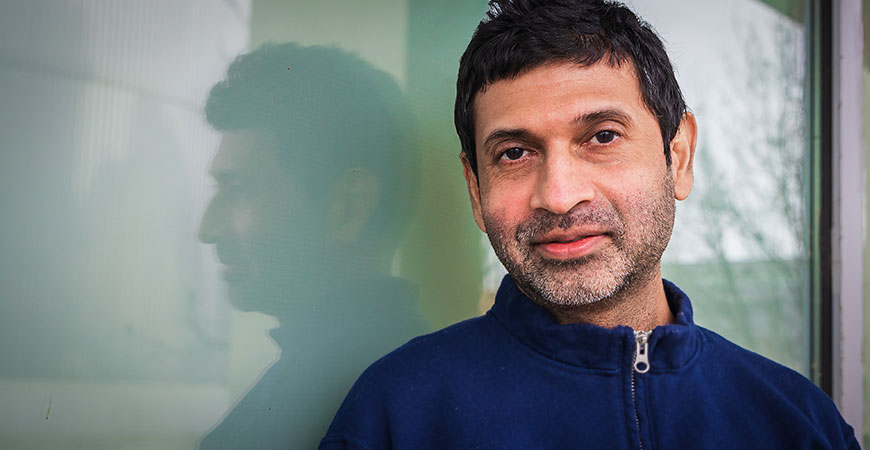
Bioengineering Professor Arvind Gopinath received a CAREER award for his research that seeks to understand how living biological materials such as bacterial swarms and fungal biofilms colonize surfaces, respond to physical features of their environments and cause infection.
He is the 25th researcher from UC Merced to earn this recognition from the National Science Foundation (NSF).
CAREER awards are among the NSF’s most prestigious awards. They are given through the Faculty Early Career Development Program to recognize untenured faculty members as teacher-scholars. Early-career faculty members are selected based on three factors: the strength of their research proposals; their potential to serve as academic role models in research and education; and their leadership in their field and organizations.
Gopinath will receive $525,868 over the next five years for his research and educational outreach.
“Our research focusses on understanding how bacterial and fungal cells cooperate and form multicellular materials, such as biofilms, that can morph and adapt continuously to challenging environments. This will help us identify mechanisms and methods by which colonization and infection may be controlled,” Gopinath said.
Gopinath and his lab are currently studying how single bacterial cells sense surfaces; the properties of living matter such as bacterial swarms and fungal films; the emergence of cooperativity in intracellular networks; and the mechanics of blood clots.
“This NSF CAREER award is key to sustaining Arvind’s very active research group and acknowledges the promise his line of research offers in better understanding the fundamental processes influencing biofilm formation,” Department of Bioengineering Chair and Professor Emeritus Tom Peterson said. “These materials can have an outsized influence on human diseases and hospital-acquired infections. I am very pleased to see his work receiving this kind of national recognition and support.”
Each CAREER award proposal includes an educational outreach component, and Gopinath’s includes working with the Fresno American Indian Health Project (FAIHP) to engage with Indigenous youth and help familiarize them with science, technology, engineering and math (STEM) studies and careers.
“Native Americans tend to be underrepresented in universities and in STEM fields, and this is partly due to a lack of engagement with the community,” Gopinath said. “STEM careers provide opportunities to give back to their communities. I am excited to collaborate and work with FAIHP and their sister organizations covering the Merced, Fresno Unified, Central Unified, and Clovis Unified schools.”
Gopinath began his full-time academic career in 2017. His interdisciplinary work spans graduate groups including Bioengineering, Materials and Biomaterials Science and Engineering, and Mechanical Engineering. He is a member of the Health Sciences Research Institute and the Center for Cellular and Biomolecular Machines. This is Gopinath’s second NSF grant to support his work studying bacteria and biofilm formation.
“The CAREER Award is a huge honor and incredibly helpful for me and for my students,” he said. “It’s nice to be recognized early in my career and is very encouraging.”




